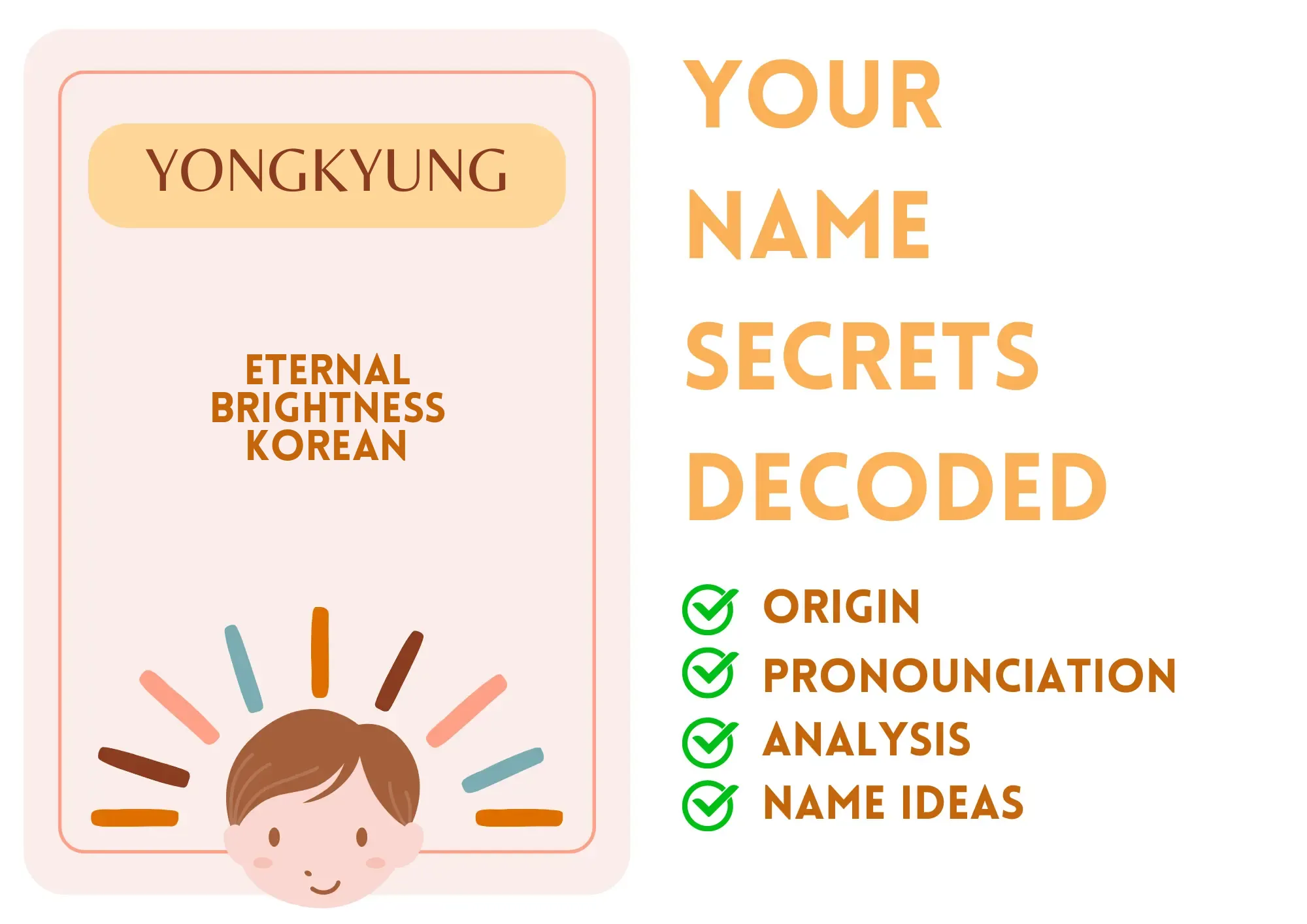
Yongkyung
Yongkyung is a meaningful and culturally significant name of Korean origin, commonly translated to mean 'eternal brightness' or 'forever luminous.' This name holds an inherently poetic quality and embodies positive attributes like hope and clarity. Yongkyung is predominantly used for boys and has a modern appeal in Korea, reflecting traditional values combined with contemporary culture.
The name conveys a sense of enlightenment and positivity, making it a favored choice among parents aiming for a strong yet beautifully resonant name. Yongkyung can be shortened to Kyung, enhancing its endearing character.
In popular culture, while not widely featured, the name Yongkyung symbolizes strength and brightness, often associated with characters that possess wisdom and clarity. People generally feel positively about this name, finding it unique, culturally rich, and easy to write and pronounce.
Basic Information
Gender: Boy
Sounds Like: YONG-kyung
Pronunciation Explanation: The first syllable 'YONG' rhymes with 'song', and the second syllable 'kyung' sounds like 'kyung' in 'young' with a slight 'g' at the end.
Summary and Meaning
Meaning: eternal brightness (Korean)
Origin: The name Yongkyung has its roots in Korea, where it is often given to boys and reflects traditional Korean naming conventions.
Usage: Yongkyung is traditionally a masculine name but could be appreciated as a unisex name in modern contexts.
Name Number (Chaldean)
Name Number (Pythagorean)
Popularity (Global Rank)
Overall: 1327923
Boys:
Most Popular in
Religious and Cultural Significance
Religion: Buddhism
Background: In Korean culture, the name Yongkyung may resonate with Buddhist principles of enlightenment and clarity.
Cultural Significance: Yongkyung is culturally significant in Korea, symbolizing bright futures and positive traits. It is often chosen for its uplifting meaning.
Historical Significance: The name Yongkyung is part of a long-standing tradition in Korea where names are carefully chosen for their meanings, reflecting the qualities parents hope their children will embody.
Popular Culture
Literature and Mythology: While not commonly featured in major literary works, the name Yongkyung resonates within narratives that portray themes of enlightenment and positivity.
Movies and Television: Characters named Yongkyung may represent virtues like wisdom and illumination, contributing to their journey within films and dramas.
Feelings and Perceptions
Perception: Yongkyung is generally viewed as a unique and appealing name. It carries a depth of cultural significance along with a modern air.
Positive Feelings: Unique, bright, inspiring, hopeful, culturally rich.
Negative Feelings: Potential unfamiliarity to non-Korean speakers could lead to mispronunciation.
Practical Considerations
Ease of Writing and Calling: Yongkyung is moderately easy to write and pronounce for those familiar with Korean phonetics. It is slightly longer, consisting of three syllables.
Common Typos and Misspellings: Yongkyung,Yongkyun,Yongkyung.
Common Nicknames: Kyung,Yong,Yongy
Yongkyung Popularity
Yongkyung Usage and Popularity By Country
| Country | Rank (Overall) |
|---|---|
| South Korea | 7517 |
| United States | 539518 |
Yongkyung Usage and Popularity By City
| City | Rank (Overall) |
|---|
Compatibility Analysis
Famous Persons Named Yongkyung
No results found for Yongkyung.
Related Names
Similar Sounding Names:
Yong,Kyung,Yunki